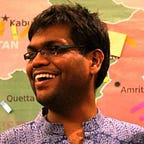In Bapu and Ba’s shadow
(This article was first published in the print edition of Business Standard on 2nd October, 2019.)
The Government of India is commemorating the 150th birth anniversary of Mohandas Karamchand Gandhi (MKG) on a large scale, within the country and on international platforms. When India’s image as the land of peace has taken a beating due to human rights violations in Kashmir, the poster boy of nonviolent resistance is being deployed for cultural diplomacy. The move might be ironic but is smart nevertheless because his personality and his ideas make him a sure-shot winner.
MKG’s legacy is worth studying but the commemorative moment is more about platitudes, less about critical engagement. In making one person the face of an entire movement, and elevating him to a god-like status, we erase the labour of those who worked behind the scenes and lived in the shadows. Regardless of whether they cared to be in the spotlight or not, we need to recognize the contributions of those unsung individuals who served tirelessly in India’s struggle for freedom from British rule. They may not have fought on the front lines, or taken a bullet, but that does not diminish their sacrifices.
The Diary of Manu Gandhi 1943–1944 sheds light on one such person. Manu aka Mridula Gandhi was the youngest daughter of MKG’s nephew — Jaisukhlal Amritlal Gandhi — and Kasumba. She came to live with MKG and his wife Kasturba, and called them Bapu and Ba respectively. Her biological mother had passed away. Manu became a satyagrahi at the age of 14. She spent her time as a prisoner in Wardha Jail, Nagpur Central Jail, and the Aga Khan Palace in Pune. While in Pune, she began writing a diary on April 11, 1943. Twelve volumes of Manu’s diaries, predominantly written in Gujarati, are lodged in the National Archives of India. Tridip Suhrud has translated, edited and annotated diary entries from that collection to put together this book. His reputation as a scholar of the Gandhian intellectual tradition raises expectations from this book, and it does not disappoint.
MKG had made it obligatory for ashramites and satyagrahis to maintain a diary as a practice of self-examination and self-purification that would help them in the pursuit of truth. However, Suhrud’s translation indicates Manu’s diary was not a private container for her thoughts and feelings. MKG read, signed and commented on what she wrote. He pointed out spelling errors, and rectified them. He encouraged her to keep an account of the yarn she spun, and record all that she read. He also asked her to improve her handwriting, and note what she learnt from others.
Suhrud has retained these corrections and comments, offering an explanation for these interventions wherever possible. MKG taught Manu about scripture and philosophy, truth and forbearance, health and nutrition. He looked out for her but was also a proponent of tough love. While Manu thought of MKG as “more than a mother,” he might come across to contemporary readers as autocratic and abusive.
Manu writes in detail about her daily schedule. Apart from participating in morning and evening prayers, and attending lessons with MKG and other elders, she has a lot of work to attend to. This includes cooking meals, preparing juice, making tea, taking Bapu for walks when he is unable to walk without support, applying ghee to Bapu and Ba’s feet, and being on call for Ba in a period of deteriorating health. Manu oils and combs Ba’s hair, gives her massages, helps Ba with her bath, and puts up with her temper tantrums that are nothing but an expression of her agony caused by illness.
On one occasion, Manu writes, “The temperature measured 102.5°C, which for Ba’s condition is high. She has a burning sensation in the urinary tract. She has become very weak. Last night she could not sleep at all. She would lie down, get up, and sit. I was with Ba in her bed. She clung to me like a child clings to her mother.” On another occasion, Manu writes, “Motiba was rather unwell. Every five to ten minutes, she would need to defecate. Sometimes, even her clothes were soiled. I would wash her clothes each time they were soiled.”
In Suhrud’s translation, Manu appears deeply devoted to Bapu and Ba. She falls ill repeatedly while discharging her duties, and tries to hide this from others. When they say harsh words to her, she assigns blame to herself. This must have been a challenging experience for someone of her age who lost her mother early in life, and also saw Ba withering away. Her emotional universe, filled with struggle and resilience, is at the heart of this book. Read it for her, not MKG.
